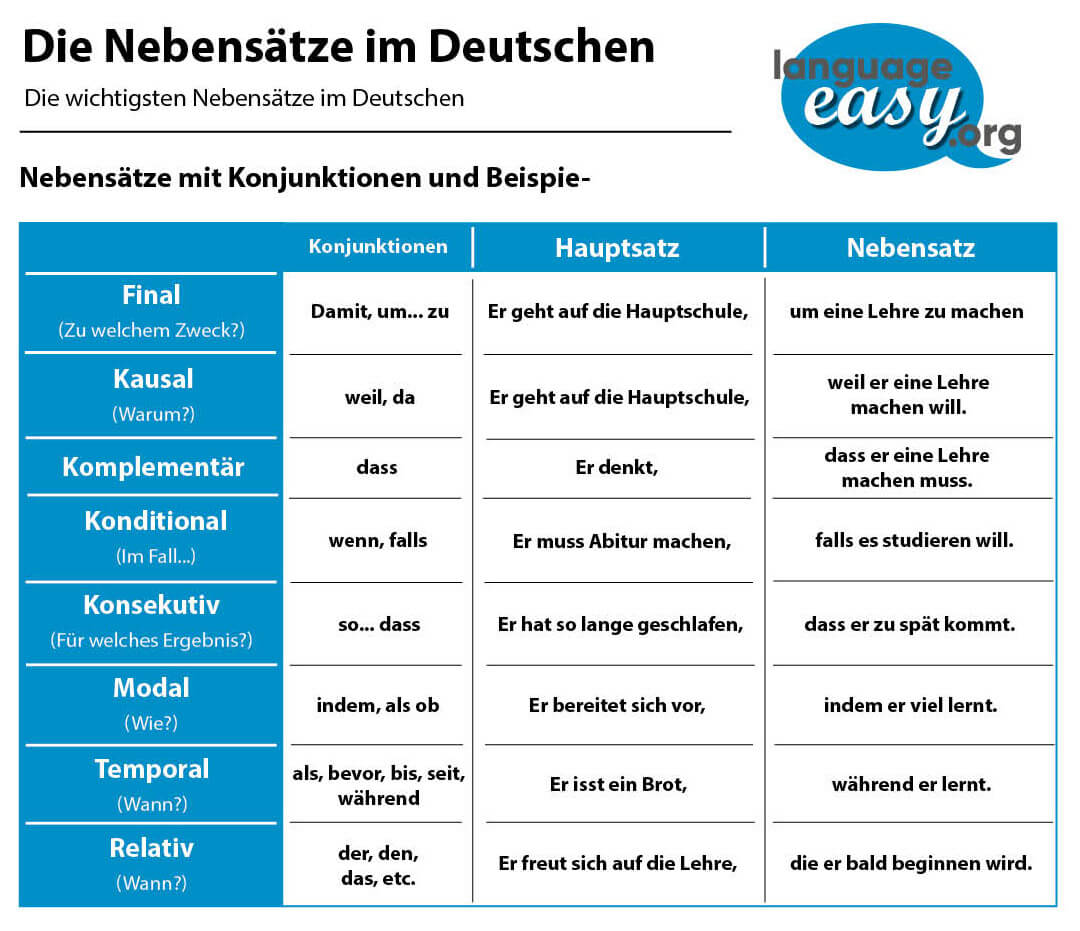German Object and Subject Clauses
Objektiv und Subjektivsätze im Deutschen – Erklärungen und Beispiele
German Object and Subject Clauses – Summary
Zusammenfassung
Adverbial clauses are used to describe a verb. Normally, they are introduced by subordinate conjunctions. In the following, you can see a list of the suboderdinate conjunctions in German.
Die unterordnenden Konjunktionen
- Temporal conjunctions: “als, nachdem, bevor, während, seit”
- Local conjunctions: “wo, woher, wohin”
- Causal conjunctions: “weil, da, wegen, denn”
- Consecutive conjunctions: “daher, so – dass”
- Conditional conjunctions: “falls, wenn”
- Final conjunctions: “damit, dass, um – zu”
- Modalen conjunctions: “wie, als ob, je – desto”
So, German Subject and Object sentences are a rather neglected part of German subordinate clauses. Although this type of clauses is not mentioned too often in German grammar books you will see that is an essential part you should master anyway: It will occur in written and spoken German language.
So, in the following I’d like to describe what German subject and object clauses actually are. Furthermore, we will go into some detail about each of these types of clauses and give examples. So, let’s not lose too much time and come straight to the first part of this article. Los geht’s!
Description of German Subject and Object Clauses
Eine Beschreibung von Objekt und Subjektsätzen im Deutschen
First of all we will describe what German subject and object clauses actually are. Normally, the subject or the object of a sentence are nouns or pronouns. But, in some cases, a subordinate clause can replace the subject of object. So, have a look at the following description of the German objective clause. Of course, we will talk about German subject clauses after that.
German Object Clause
So, the German object clause is a subordinate sentence which replaces the object of a sentence. Well, is replaces each type of object, no matter if it’s a genitive, dative or accusative one. For those of you who know how to deal with the approach of understanding of sentence elements: The question for a German object clause is logically “Wessen? / Wem? / Wen? / Was?“.
So, here are some example which illustrate what I mean by this description:
- “Philip ist sich bewusst, dass seine Katze Flöhe hat.”
(Wessen ist er sich bewusst? – genitive object) - “Ich schenke mein Herz, wem ich möchte.”
(Wem/Was schenke ich? – dative object) - “Er hat nicht gesehen, wer das Auto angefahren hat..”
(Wen/Was hat er nicht gesehen? – accusative object) - “Wir alle wollen, dass er gewinnt.”
(Was wollen wir? – accusative object)
German Subject Clause
Well, as you already might have thought, the German subject clause is a subordinate clause that replaces the subject of a sentence. So, in this case, that question you have to ask in order to determine this element is “Wer? / Was?“.
Just have a look at the following examples.
- Wer den Mund aufmacht, wird bestraft.
(Wer/Was wird bestraft?) - Es ist doch klar, dass ich es nicht gewesen bin!
(Wer/Was ist klar?)
Exercises
Übungen
Finally, we have reached the last part of this article where you can prove the German skills you have just learned. In the following you will see some phrases that you should complete with the correct terms. Once you have filled all the gaps, just click on the “correct” button and you can see your errors and the correct results. Good luck and… auf Wiedersehen!



